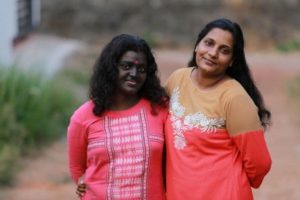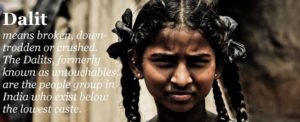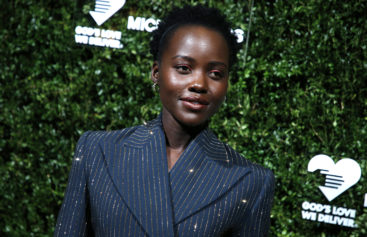There are efforts in India to fight colorism, that nation’s historical system of discrimination against dark-skinned people.
In Southern India, a woman is taking a stand against the discrimination faced by the Dalit community, who are historically known as untouchables at the bottom of the Hindu caste system. And she is taking a stand by painting herself black.
As the BBC reported, Jaya PS, 26, who has a masters degree in art, paints her body with a type of dark eye shadow when she walks out in public.
“I decided to paint my body black while appearing in public after Rohith Vemula died,” she told the BBC. Vemula, a Ph.D. student at the University of Hyderabad, killed himself in January due to the caste discrimination he experienced at school.
Jaya is now expressing her solidarity with Vemula and others who have committed suicide.
“Caste is closely related to color, and whatever is black is not welcome in the Indian society. I experienced its severity when I started painting myself black,” she said. Her form of protest is viewed as unique, as in other South Asian and African nations, lighter skin is viewed as desirable. And in India, darker skin was always considered ugly.
Known as a brilliant sociology student and an aspiring science writer, Vemula was reportedly isolated and treated like a pariah, and his pleas fell on deaf ears, according to the BBC. Vemula and other Dalit students protested after they were expelled from university housing, and faced unfounded allegations they had assaulted a Hindu nationalist student leader. The university cut off his stipend, and suspended him.

Jaya with her sister Jalaja PS who helps her to paint her body. BBC
“Please give us poison at the time of admission itself instead of humiliating us like this,” he had written in a letter to the university administration, requesting that each Dalit student receive a “nice rope.”
Further, in his subsequent suicide note, he expressed the pain he experienced.
“For some people life itself is a curse. My birth is my fatal accident. I can never recover from my childhood loneliness. I am not hurt at this moment. Not sad, just empty. That is pathetic. That is why I am doing this.”
There are 180 million Dalits in India, the lowest caste and the victims of an ancient apartheid system in which people in the highest caste are not to touch anything that was touched by people in the lowest caste. Traditionally relegated to the dirtiest manual jobs such as cleaning toilets, Dalits — 16 percent of the country’s population — face continued poverty, discrimination and marginalization in society. And although the caste system was constitutionally abolished by Indian democracy, the practice continues.
According to Navsarjan, a grassroots Dalit human rights organization, “Dalits have been oppressed, culturally subjugated, and politically marginalized. The principals of untouchability and “purity and pollution” dictate what Dalits are and are not allowed to do; where they are and are not allowed to live, go, or sit; who they can and cannot give water to, eat with, or marry; extending into the minutia of all aspects of daily life.”
Meanwhile, skin lightening creams are a very lucrative business in India. As The Guardian has reported, in 2010 the industry was worth $432 million, and increasing at 18 percent annually. It all started in 1978, when Unilever launched Fair & Lovely cream, leading to the proliferation of various bleaching products, which Bollywood stars and cricket players endorse. Moreover, Indians consume more lightening creams than Coca-Cola. A Dark Is Beautiful campaign has challenged the notion that lightness is the measure of success and beauty.
“Indians are very racist. It’s deeply ingrained. But there is so much pressure by peer groups, magazines, billboards and TV adverts that perpetuate this idea that fair is the ideal,” film star Nandita Das, a campaign supporter, told The Guardian. Das said directors and makeup artists have tried to lighten her skin when she played the role of an educated, upper-class woman.
Even Indian schoolbooks are promoting skin bleaching creams since childhood #DarkIsBeautiful #UnfairAndLovely: pic.twitter.com/2KdtBIpVqn
— Koba El Tigre ☭ (@KobaElTigre) March 14, 2016
I disobeyed my racist aunty and stayed out in the Caribbean sun, plane spotting for 7 hours! #darkisbeautiful pic.twitter.com/ulRNfVIiGO
— Wilbur Sargunaraj (@wilburworldwide) March 16, 2016
#DarkIsBeautiful pic.twitter.com/Uu32LynrKT
— Ghost (@ORIGINALADREAM) March 28, 2016
Someone precious decided to support a cause that I can so relate to #proud #DarkIsBeautiful @harsha_actor @wow_india pic.twitter.com/YlHqi0mqAa
— Dana.B (@Danabolly) March 8, 2016
Similarly, Pax Jones, a Black student at the University of Texas at Austin, began a global campaign under the hashtag #unfairandlovely to combat colorism and the underrepresentation of people of color in the media, according to The Huffington Post. Jones launched the campaign by featuring photos of her South Asian classmates Mirusha and Yanusha Yogarajah.
Fighting dark-skin prejudice one #UnfairAndLovely selfie at a time: https://t.co/efzha1zZke #darkisbeautiful pic.twitter.com/epPJ6quhsj
— Claire S. McKenzie (@claire_hottie) April 10, 2016
Just because everybody sleep on us Indians ? #unfairandlovely ? pic.twitter.com/bSlSae6sPH
— tori. (@vsmera_) April 12, 2016
We’re back! #UnfairAndLovely #DesiBeauty pic.twitter.com/3cIf0qs1gs
— ✨Desi Beauty✨ (@desibeautyy) April 11, 2016
“Colorism has been defined as skin color discrimination. And to talk about it more precisely, it’s discrimination that targets dark-skinned people. And it’s a form of discrimination in which dark-skinned people are seen as inferior, less beautiful, less competent, less intelligent, and less accomplished than light-skinned people,” said Dr. Radhika Parameswaran — Professor in the School of Journalism and adjunct faculty in the Cultural Studies and India studies programs at Indiana University, Bloomington — according to jyotigupta.org.
Parameswaran said that the term colorism takes skin color discrimination beyond the realm of mere individual prejudice, placing it on par with other forms of oppression such as racism and sexism.
“By calling it colorism what we are actually doing is saying that the ways in which dark-skinned people are treated as inferior is systematic, it’s widespread, it’s a part of social, economic and cultural institutions and it needs to be tackled society-wide,” she added.
India, according to the professor, has not studied colorism as other countries have, despite its pervasiveness.



